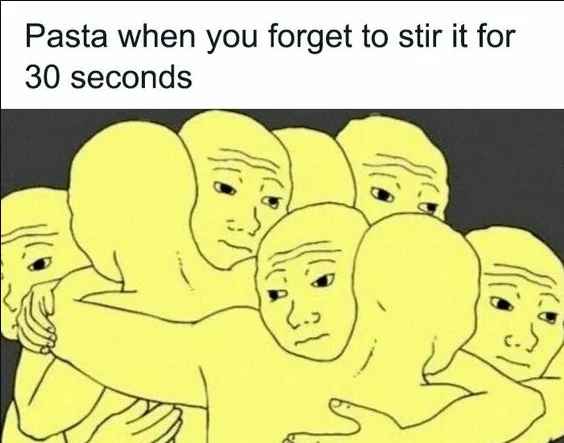Do you cook your pasta in a large pot, with plenty of boiling water, and a good amount of salt? Usually I just stir once just after putting the pasta in, and I never have noodles sticking together.
memes
Community rules
1. Be civil
No trolling, bigotry or other insulting / annoying behaviour
2. No politics
This is non-politics community. For political memes please go to [email protected]
3. No recent reposts
Check for reposts when posting a meme, you can only repost after 1 month
4. No bots
No bots without the express approval of the mods or the admins
5. No Spam/Ads
No advertisements or spam. This is an instance rule and the only way to live.
Sister communities
- [email protected] : Star Trek memes, chat and shitposts
- [email protected] : Lemmy Shitposts, anything and everything goes.
- [email protected] : Linux themed memes
- [email protected] : for those who love comic stories.
It depends on the pasta (form, freshness, self-made... etc). Some has to be stirred 3-4 times others just once, in my experience.
It's not salting your water, nor the water volume to pasta ratio, nor if the water is boiling or not, nor oil in the water, but stirring early in the cooking process that will prevent sticking.
From the great Kenji Lopez-Alt:
Pasta is made up of flour, water, and sometimes eggs. Essentially, it's composed of starch and protein, and not much else. Now starch molecules come aggregated into large granules that resemble little water balloons. As they get heated in a moist environment, they absorb more and more water until they finally burst, releasing the starch molecules into the water. That's why pasta always seems to stick together at the beginning of cooking—it's the starch molecules coming out and acting as a sort of glue, binding the pieces to each other, and to the pot.
...
The problem is that first stage of cooking—the one in which starch molecules first burst and release their starch. With such a high concentration of starch right on the surface of the pasta, sticking is inevitable. However, once the starch gets rinsed away in the water, the problem is completely gone.
So the key is to stir the pasta a few times during the critical first minute or two. After that, whether the pasta is swimming in a hot tub of water or just barely covered as it is here, absolutely no sticking occurs. I was able to clean this pot with a simple rinse.
Wow, this guy is amazing!
Yep, I really like how he applies the scientific method to cooking. Some of my favourites are how he's found the perfect way to boil an egg, cook steaks and roasts (dry brine, reverse sear), and make chocolate chip cookies (he made over 1500 cookies testing how changing each variable changed the final cookie).
My biggest gripe with cooking instructions is the non-specificity. “Stir pasta frequently”? How frequently? How continuously? Tell me in unit Hertz
I won't accept my pasta at anything lower than 120Hz.
Not sure your pasta will survive that kind of speeds...
What kind of dumb instructions are that?
Stirring exactly once is enough in most cases.
Is this a meme I'm too Italian to understand?
Yeah, I also don't get it. I don't stir pasta, maybe once in the middle. It never sticks.
Skill issue

Gift
I have actually never seen this before. Other comments are saying its because you dont salt your water and i do so probably thats why. It also makes the taste better so overall recommended.
Y'all need to salt your water.
It prevents nearly all the sticking and it makes pasta delicious
It's not the salt that prevents the sticking. You use a larger pot with plenty of water. Still delicious though :P
And while you’re at it, shell out the extra 50 cents or whatever for the bronze cut pasta. It has a much nicer texture and allegedly makes sauce adhere to the pasta more.
It's really the first couple minutes that are critical
I've never once had pasta sticking together in the pot, regardless of what I do.
137 times more powerful than the Electromagnetism you try and use to tear them apart, behold the Strong Pasta Friendship Force!

